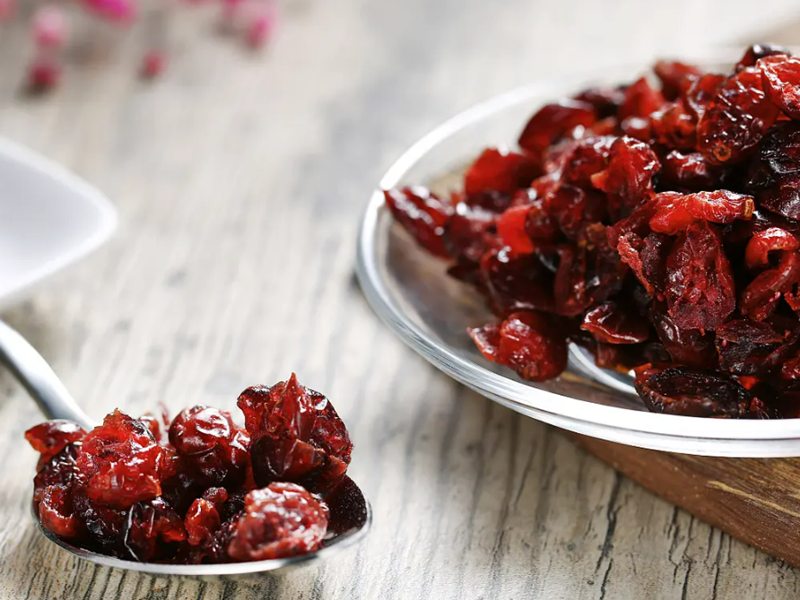Native peoples across North America have a long history of consuming wild cranberries, eating them fresh or dried and making a mixture of peppers, dried berries, meat and animal fat. They came to know the health benefits of cranberries, using them as a traditional remedy for fever, swelling and seasickness. Today, there are about 40,000 acres of cranberry farms in the United States. Nutrients found in cranberries include:
- Vitamin C- supports immune health, skin, muscles and bones, and wound healing;
- Vitamin E- an important antioxidant that supports immune health;
- Vitamin K1 – essential for blood clotting;
- Fiber – for gut health and immune support;
- Flavonoids – antioxidants that support immunity and brain health;
- Quesetine – helps with allergies, and joint pain;
- Proteinamides – polyphenols that contribute to urinary and intestinal health, heart disease, and cancer.
So how are these nutrients effective in helping dogs? First, let’s talk about antioxidants. Dogs need antioxidants. Oxidation in the body is like rust in a car. It’s part of the aging process, which creates things called free radicals. Free radicals are natural products of metabolism. They also come from toxins like drugs, chemicals and some foods, and they can build up in your dog over time. Even though free radicals are part of the body’s normal processes, too many can damage a dog’s cells, cause the dog to age faster, and even damage DNA. These impairments may lead to the development of degenerative diseases such as arthritis, diabetes, kidney disease, cognitive dysfunction, and cancer. So it’s important to understand why antioxidants are in your dog’s diet. In fact, diet is the only way to control oxidation, and antioxidants in food can help stop free radicals from multiplying. Antioxidants come from plants, fruits, and especially berries like cranberries.
Antioxidants in cranberries
1) Anthocyanins
Anthocyanin is one of the major antioxidants of plants. Studies have shown that anthocyanins have many health-promoting properties. The anthocyanins in cranberry juice help boost the antioxidant capacity of animal organs, support the immune system, and prevent cancer, diabetes, heart disease, cognitive problems, vision loss, neurological problems, and obesity.
(2) Concentrated tannin. They are also polyphenols, known as “attack and defense molecules”. This is because they have strong antioxidant properties. Some researchers claim they are 20 times stronger than vitamin C or E.
(3) Quercetin
Quesetin is another flavonoid antioxidant found in plants. Quesetin is found in many plant foods… This includes cranberries, but also apples (especially the peel), other berries, and peppers. Quesetine plays a powerful role in reducing oxidative stress and also in managing inflammation. As such, it can help prevent all kinds of inflammation and control allergies.
The health benefits of cranberries for dogs
- Anticancer
Half of all dogs over the age of 10 die of cancer. Cranberries can help your dog control cancer. Studies have shown that cranberry extract can prevent or slow tumor growth in some cancers. Several studies in mice and mice have successfully demonstrated that cranberries can help manage cancer by helping to increase apoptosis (cancer cell death). Some studies have shown that cranberry phytochemicals combine to produce synergistic health benefits. Cranberries may even help manage the side effects of traditional cancer treatments. In a study in rats, cranberry extract reduced heart damage from the dangerous chemotherapy drug doxorubicin.
- Treat urinary tract infections in dogs
The prevention and treatment of urinary tract infections are one of the best-known medicinal uses of cranberries. Urinary tract infections may be more common in women (humans and dogs). Cranberries can help prevent and manage urinary tract infections. They can also stop repeated infections if your dog is prone to them, many UTis are caused by E. coli, and cranberries have antibacterial properties. One way they help is by preventing E. coli from sticking to the cells lining the urethra. One of the ingredients in cranberries that helps prevent urinary tract infections is D-mannose, a sugar that stops E. coli from hanging onto urethral cells. A 2012 Brazilian study showed that cranberry juice or capsules reduced urinary tract infections by 35 percent; Among women with recurrent Utis, the rate of new infections fell by 39 percent over 12 months.
3. Management of intestinal
A balanced gut microbiome is crucial for a dog’s health, not just for digestive health, but also for the immune system because nearly 90 percent of a dog’s immune system comes from the gut, and cranberries can help balance the gut.
In 2016, a study showed that the antibacterial power of cranberries in the gut goes well beyond cranberries’ well-known efficacy in urinary tract infections. The researchers discussed the wide range of antimicrobial, antifungal, and antiviral effects of cranberries. In fact, cranberries can help control many bacteria and fungi, especially:
Helicobacter pylori – a risk factor for ulcers and gastric cancer;
Streptococcal mutations, which live in the mouth and cause cavities;
Bofferomena gums – also in the mouth, causing gum disease;
Staphylococcus aureus – causes staphylococcus aureus infections;
Pseudo-donas Arruginosa – causes lung infections, pneumonia;
A new form of Cryptococcus, a fungus or yeast that affects immunocompromised patients;
Haemophilus influenzae – which can cause meningitis and bloodstream infections;
Candida, the most common fungus in yeast infections;
Exenteric pathogenic Escherichia coli (ExPEC) —- A virulent bacterium causing widespread infections.
- Reduce your risk of heart disease
Cranberries may help reduce the risk of heart disease in dogs. They reduce blood clotting, lower blood pressure, less clogged arteries, lower stroke risk, and lower C-reactive protein (a marker of inflammation).
- Prevent diabetes
Berries are great for diabetics in general and cranberries in particular! They’re lower in sugar than most fruits, with cranberries being particularly low in sugar and high in fiber, which helps lower blood sugar and diabetes risk.
Note: If your diabetic dog takes insulin, consult a veterinarian before giving cranberries. You need to monitor its blood sugar levels carefully to avoid overtreatment, which can lead to life-threatening hypoglycemia.
- Promote oral health
Oral health is important because inflammation in the mouth can lead to inflammation throughout the body. Cranberries stop bacteria from sticking to the urethra or lining of the gut, and they also stop bacteria from sticking to teeth and gums.
Side effects of cranberry consumption in dogs
Some veterinarians warn about the risks of cranberries. They say oxalate in cranberries may increase the risk of oxalate stones. A 2005 Mayo Clinic study suggested that cranberry juice may increase the risk of urinary stones. But another study from the University of Cape Town found the opposite. The results: Cranberry juice may help manage calcium oxalate stones. Therefore, to be on the safe side, exercise caution, or at least consult a veterinarian first. Also, cranberries may interfere with anticoagulant medications, consult your veterinarian if your dog is taking blood-thinning medications, cranberries may increase bleeding risk.



